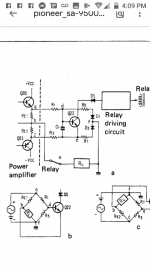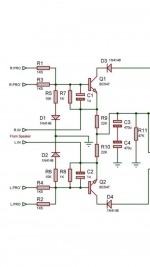Its worth noting that modern CMOS versions of the 555 are better, and in particular don't have large shoot-through current spikes from the output pin driver (the old 555's need about 100uF decoupling to tame this 400mA glitch, CMOS chips like the 7555 are happy on the standard 100nF decoupling.
CMOS 555s swing rail to rail so the astable multivibrator circuit (aka square wave oscillator) needs only a single R and a single C and yet its timing is more precise than the 2R+1C circuit everyone copies from the 555 datasheet.
ne555 protection problem
but in stereo PCB R680k dont connected to pin number4 of ne555.
now which one is correct?
in mono PCB i see that a R680K connected to pin number 4 of ne555.APEX protect with NE555
but in stereo PCB R680k dont connected to pin number4 of ne555.
now which one is correct?
APEX protect with NE555
Hi Mile and rest of guys of this wonderful forum. This speaker with NE555 is interesting but I see that it only detects DC voltage but I would like to add an overload protect circuit to it. What kind of Overload circuit would you add? Once I was experimenting a protect circuit with this famous chip but using the reset pin as a control to switch on/off the timer operation. Well, thank you for your attention. Thanks beforehand for your replies.
> like to add an overload protect circuit to it
Define "overload".
Clipping? Over-voltage? Over-current? Over-temperature? In transistors or in transformer? Slewing? Excess sound level in the room?
CROWN had good overload protection in the DC-300, but they could be killed. CROWN spent several decades evolving their protection systems, as the industry played tag-along (sometimes getting ahead). Modern PA amps (not bottom-price) are pretty blowup-proof, but partly because the price of big transistors, and heatsink economics, encouraged gross over-provisioning. (And then came switching amps....)
Are you blowing-up your amplifier? What is it and how are you typically abusing it?
Define "overload".
Clipping? Over-voltage? Over-current? Over-temperature? In transistors or in transformer? Slewing? Excess sound level in the room?
CROWN had good overload protection in the DC-300, but they could be killed. CROWN spent several decades evolving their protection systems, as the industry played tag-along (sometimes getting ahead). Modern PA amps (not bottom-price) are pretty blowup-proof, but partly because the price of big transistors, and heatsink economics, encouraged gross over-provisioning. (And then came switching amps....)
Are you blowing-up your amplifier? What is it and how are you typically abusing it?
Hello PRR, thanks for replying. Nop, I am not blowing up my amplifiers 🙂 but I want to build circuit that allows me to switch off a relay when a load with very low impedance is connected to amplifier output. For example under 4 ohms. I want to keep my amplifiers operating with loads of minimum 4 ohms, if a 2 ohm load is connected, the circuit will detect it and switch off the output relay. I have see several circuits from vintage Power amplifiers such as old Sansui and Pioneers using Overload circuits for this task.
Usually we use V/I limiting to restrict output in low impedances. Can you show these other overload circuits you have seen?
- Home
- Amplifiers
- Solid State
- 555 Timer DC Protect / Turn-On Delay

